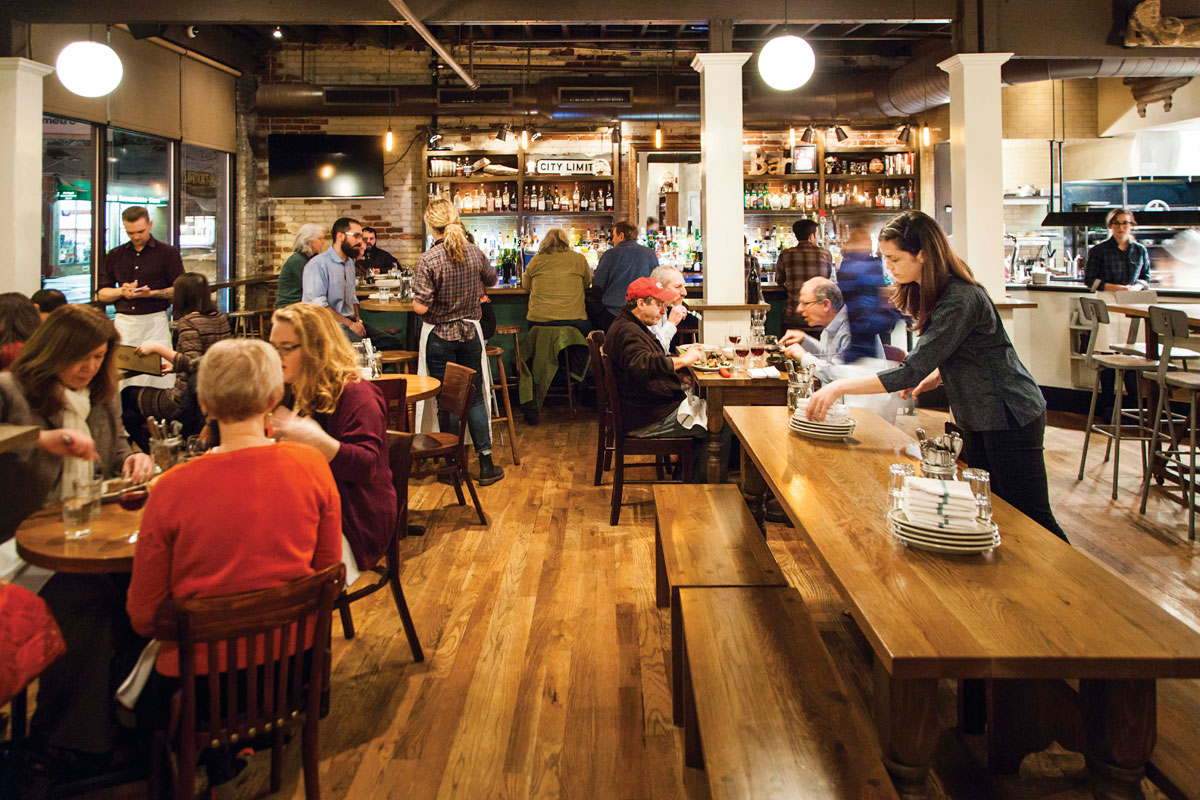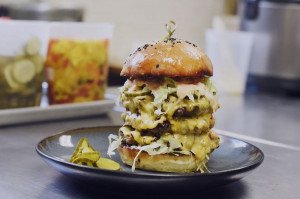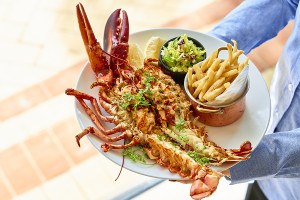Restaurant Review: The Kirkland Tap & Trotter in Somerville

The airy dining room at the Kirkland Tap & Trotter. (Photograph by Anthony Tieuli)
While dining at the Kirkland Tap & Trotter, I kept asking myself, “Would this pass the blindfold test?” That is, if you didn’t know this was food under the supervision of Tony Maws, possibly Boston’s most famous current chef, would you think it was particularly notable? Would you consider it much more than big, agreeable, meaty food suited to be paired with a very good on-tap beer list?
After two out of the three times I dined there officially, I’d say no (the very first was an early meal I won’t count, though it was, in fact, quite good). Kirkland, as it’s hard not to know given the amount of publicity it’s gotten, is the highly anticipated second restaurant from Maws, whose success at his Central Square flagship, Craigie on Main, certified him as a bona fide local food god. Where Craigie on Main has been about keeping pace with international cuisine trends, Kirkland goes back to Maws’s roots in using nose-to-tail techniques and local ingredients—two practices so commonplace now as to be all but beneath mention, but cutting-edge when he started Craigie on Main’s predecessor, Craigie Street Bistrot, in 2002 (it moved from its original location and became Craigie on Main in 2008). The Bistrot made its name serving classic food with a then-newish emphasis on offal and superb terrines and pâtés; Craigie on Main evolved to be much more personal and adopted many unclassic techniques and ingredients—like Vietnamese sauces on fried pigs’ tails and imaginative hybrids like pumpkin sambal and boudin noir hoisin sauce on (a spectacular) roast pig’s head.
On the Cambridge-Somerville line next to Dalí, Kirkland cheerily evokes a classic form, like the Bistrot did—here, a cross between British pub and French brasserie. As at Craigie, there’s an open kitchen, which looks out onto the bar area and dining room. Kirkland is bigger and airier, though, with some walls of stripped concrete, others of exposed brick, and a crowded bookshelf on one wall of the bar. There’s a communal table with views of the kitchen; a strong bar program; and service that signals casual friendliness. It is frankly more pleasant to sit in than the always-cramped Craigie, even when it’s packed, as it was from the start.
The food is meant to be comfortable, too. Maws says he wanted to evoke the meals he’d cook for his family on a Monday night, the usual chef’s night off. By that, he means far simpler dishes than those at Craigie. Unless you’re the dab hand that Maws is at, say, rabbit terrine or confit pork belly, though, you’re not likely to enjoy many of these dishes at home.
However, you might have a higher hit-to-miss ratio than Kirkland did three months in. On some visits, I found inconsistencies in seasoning, richness, and portion size, which, because of ambiguous menu organization at the time of my visits, seemed to bear little relation to price, or to whether the dishes were meant as first or main courses.
Some plates were forgettable the moment they were cleared. But others you’d find yourself jonesing for in the days and weeks afterward: effortless perfection. Like crisp-fried whole smelts as an app one night, served with a creamy Thousand Island–style sauce with pickles ($14); a beet, puy lentil, and frisée salad that bristled with freshness, with crumbled Berkshire blue cheese sprinkled throughout ($15); or that rabbit terrine accompanied by three homemade mustards ($14), every bite full of moist flavor with the ideal fat-to-lean balance.
Two years ago, chefs started competing over who had the most artisanal brick oven for wood-fired pizza. Maws is the first local chef I know to have a wood grill from Grillworks, which makes Tuscan-style models with ingenious subtleties, like the ability to lift and lower on a pulley a grooved metal shelf that allows slow cooking, letting food absorb a gentle smoke flavor. I’m hoping for a similar arms race. Kirkland’s cooks put the grill to sometimes brilliant use, turning out dry-rubbed wonders that showcased what Maws credits his first teacher and mentor, Chris Schlesinger, with showing him years ago at East Coast Grill. Like smoky lamb ribs ($15), say, or a dramatic grilled salmon head ($16) that was the Kirkland showstopper and a dish that demonstrated why so many chefs say that cheek and jowl are the sweetest meats.
Let’s say, then, that Kirkland has its merits. Especially if you stick to stuff you can suck.
For instance, shrimp in an ancho-chili dry rub, four on a skewer, over that pink pickle sauce with some baby arugula and thin-sliced watermelon radish ($16): gone in a minute, including the shells, which I ate, too. Lamb ribs, black with smeared garlicky vadouvan, were lightly smoked before being grilled and are guaranteed to make you happily wipe lamb fat off your mouth. Half a chicken ($24), cut into pieces and marinated overnight with za’atar and other Mediterranean spices, was infused with flavor as much by the grill as by the herbs and spices, which Maws says he buys from a spice shop in the West Village that sells to no less than Ana Sortun.
Portion sizes, though, were simply puzzling. Maybe it was the menu categorization, which put “cold” where appetizers would be, then “fish,” “meat,” and “vegetables” where you would have expected main courses to be. The idea was that anything, cold or veg, could be an app or a main, to mix and match as you like. But it didn’t provide a guide to how to make a meal—and neither did the servers.
The chicken, for instance, was a more than generous main course, and well enough priced at $24. But the lamb ribs, listed in the same “meat” section, were barely enough for one as an appetizer. Grilled sirloin tips with a cilantro salsa verde and odd but intriguing grilled avocado halves weren’t much more generous than the shrimp: four little squares of meat—a somewhat generous app, but at $26 (now $32 as an entrée ) pricier than the chicken. (The menu has since been updated with clearly delineated appetizer and entrée sections.)
Other inconsistencies were presumably artifacts of this extended settling in. Several appetizers, like the tuna rillettes ($14), came to the table so cold you could barely discern what flavors the kitchen was going for. Short ribs ($28) required, like the chicken, “20-plus” minutes of advance-order time, yet were in dire need of longer braising. Grilled pleurotes, porcini, and hen-of-the-woods mushrooms over a soothing pesto of walnut and arugula ($15) were the best standalone of the vegetables; the Brussels sprouts ($8), meanwhile, were underseasoned and swimming in duck fat.
Desserts (all $10) were variable, too. Fruit crisp with maple ice cream had too much crumble topping and not enough fruit, and all of it was undercooked. Bread pudding one night was tepid and runny; another night, it was like a warm soufflé—hot out of the oven and terrific. Best to my mind was a sweet-potato cake that was a pretty great take on a carrot cake, with maple–cream cheese frosting I could eat with a spoon.
Kirkland needs more time to find its groove. The best dinner by far that I had there was on a Monday night when the place was three-quarters empty and Maws was off duty; I took this to mean that the menu’s a bit long and ambitious and the kitchen not yet ready to handle the crowds. But that’s what I say, not what the crowds say. Kirkland is a crowded hit and, I’d bet money, set to stay that way.
MENU HIGHLIGHTS
Lamb ribs • $15
Fried smelts • $14
Grilled salmon head • $16
Rabbit terrine • $14
Roast half chicken • $24
Sweet-potato cake • $10
The Kirkland Tap & Trotter, 425 Washington St., Somerville, 857-259-6585, kirklandtapandtrotter.com.
Critic Corby Kummer—an editor at the Atlantic and author of The Pleasures of Slow Food—has been reviewing Greater Boston’s top restaurants in our pages since 1997.


